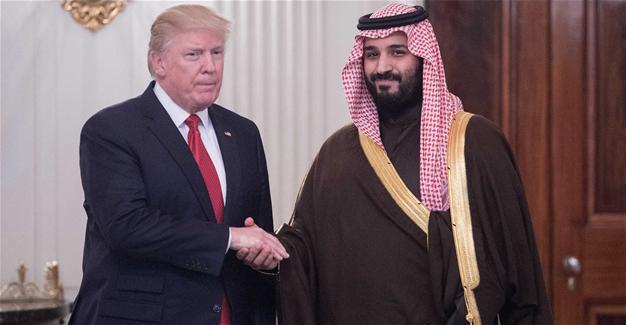Saudi king empowers son in royal shake-up
DUBAI – Reuters
 Saudi Arabia’s King Salman made his son next in line to the throne yesterday, handing the 31-year-old sweeping powers as the kingdom seeks radical overhaul of its oil-dependent economy and faces mounting tensions with regional rival Iran.
Saudi Arabia’s King Salman made his son next in line to the throne yesterday, handing the 31-year-old sweeping powers as the kingdom seeks radical overhaul of its oil-dependent economy and faces mounting tensions with regional rival Iran.Although Mohammed bin Salman’s promotion to crown prince was expected among those who follow the royal family closely, the timing was a surprise, putting the kingdom’s future in relatively untested hands.
He replaces his cousin, Prince Mohammed bin Nayef, a veteran security chief who led the Saudi campaign against Islamic State of Iraq and the Levant (ISIL) and al-Qaeda at a time when Riyadh faces heightened tensions with Qatar and Iran and is locked into a war in Yemen.
Mohammed bin Salman’s appointment may make Saudi policy more hawkish against long-time enemy Iran and other Gulf rivals such as Qatar, increasing volatility in an already unstable region, analysts say.
“The elevation of Mohammad Bin Salman to the Crown Prince will likely mean minimal change to oil production policy but could bring more aggressive foreign policy moves that bring back the political risk premium,” said a note by RBC Capital Markets.
The young prince is often charming in person, but analysts say his rapid rise has also created friction within the ruling family and made Saudi policy less predictable than in recent decades.
A favorite son of his elderly father, his youth and dynamism have also appealed to many younger Saudis, who constitute the biggest proportion of society and are often eager for change.
After decades in which the same small group of princes handled Saudi affairs on the world stage, Prince Mohammed has led diplomacy with global powers, reportedly charming both U.S. President Donald Trump and Russian President Vladimir Putin.
Mohammed bin Salman was appointed crown prince and deputy prime minister by royal decree. He retains the defense, oil and economy portfolios.
The previous crown prince, Mohammed bin Nayef, the king’s nephew and a counter-terrorism chief admired in Washington for putting down an al-Qaeda campaign of bombings in 2003-06, was relieved of all his posts, according to the decree.
The royal decree said the decision by King Salman to promote his son and consolidate his power was endorsed by 31 out of 34 members of the Allegiance Council, made up of senior members of the ruling al-Saud family.
Intent on dispelling speculation of internal divisions in the ruling dynasty, Saudi television was quick to show that the change in succession was amicable and supported by the family.
Throughout the early morning it aired footage of Mohammed bin Nayef pledging allegiance to the younger Mohammed bin Salman, who knelt and kissed his cousin’s hand. “I am content,” Prince Mohammed bin Nayef said. Prince Mohammed bin Salman replied: “We will not give up taking your guidance and advice.”
Iran, Saudi Arabia’s main rival for regional influence, called Prince Mohammed’s appointment a “soft coup.”
Arab leaders, including Oman’s Sultan Qaboos, Jordan’s King Abdullah and Egypt’s Abdel Fattah al-Sisi congratulated bin Salman on his appointment.
















